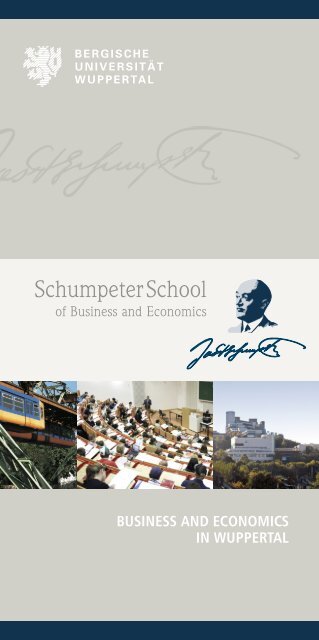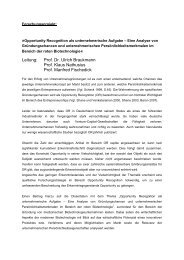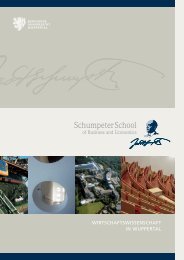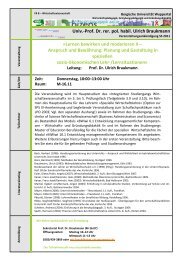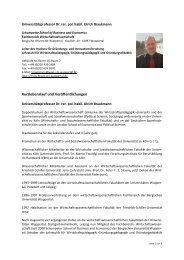SchumpeterSchool - Prof. Dr. Braukmann - Bergische Universität ...
SchumpeterSchool - Prof. Dr. Braukmann - Bergische Universität ...
SchumpeterSchool - Prof. Dr. Braukmann - Bergische Universität ...
Create successful ePaper yourself
Turn your PDF publications into a flip-book with our unique Google optimized e-Paper software.
B E R G I S C H E<br />
U N I V E R S I T Ä T<br />
W U P P E RTA L<br />
<strong>SchumpeterSchool</strong><br />
of Business and Economics<br />
BUSINESS AND ECONOMICS<br />
IN WUPPERTAL
2 · 3<br />
SCHUMPETER SCHOOL<br />
OF BUSINESS AND<br />
ECONOMICS<br />
Dear Reader,<br />
As the dean of the Faculty of Business and Economics of the University of<br />
Wuppertal, it is my pleasure to present you with our new faculty brochure<br />
in English. It will give you an overview of our university and faculty, our<br />
study programs and our research activities. You may also find interesting<br />
facts about the City of Wuppertal, as well as details on our new faculty<br />
name “Schumpeter School of Business and Economics”, which was first<br />
introduced in the 2008/2009 winter semester and is fast becoming the<br />
trademark of our faculty. Hopefully here you will find all the information<br />
you need for taking Wuppertal into consideration as a place for studying<br />
business and economics. Please do not hesitate to contact us for further<br />
information: we will be happy to hear from you and also perhaps get to<br />
know you within the next few semesters at the Schumpeter School.<br />
Now, I would like to put the latest excellence rankings into focus: Very<br />
recently, in October 2009, we were selected as one of the only 51 European<br />
universities to be awarded the Seal of Excellence in Economics.<br />
This seal honours the large number of citations we have in international<br />
journals, the high level of mobility and internationality of our staff as well<br />
as other factors. It shows that our faculty offers you both excellent study<br />
and top research conditions.<br />
At the start of the 2008/2009 winter semester UW’s Faculty of Business<br />
and Economics was officially named the “Schumpeter School of Business<br />
and Economics”, a step that reflects the emphasis on innovation in our<br />
modern faculty and gives us a clearer profile in the university landscape.<br />
When choosing a figure after whom a school, faculty or institution is to<br />
be named, there are usually two alternatives: on the one hand the person<br />
chosen may have had an historical or geographical connection with the<br />
institution – in which case the name will not generally have programmatic<br />
significance. We on the other hand took the “high road” and chose the<br />
name of Joseph Alois Schumpeter, who was not a local resident, in order<br />
to express the programmatic focus of the faculty with clarity.<br />
Schumpeter’s comprehensive preoccupation with structural change, innovative<br />
business concepts, innovation-supporting market structures, economics<br />
education and the legal support for innovations has become the<br />
hallmark of our orientation. At a time of increased social change these<br />
topics are more up-to-date than ever. The long-established Wuppertal tradition<br />
of interdisciplinarity in research and teaching is also reflected in<br />
Schumpeter’s work. Our new name therefore, unambiguously indicates<br />
what economics at the University of Wuppertal stands for.<br />
Best regards<br />
<strong>Prof</strong>. <strong>Dr</strong>. Michael J. Fallgatter, Dean<br />
TABLE OF CONTENTS<br />
PAGE 3 SCHUMPETER SCHOOL<br />
PAGE 4 CITY OF WUPPERTAL<br />
PAGE 6 UNIVERSITY OF WUPPERTAL<br />
PAGE 7 FACULTY OF BUSINESS AND ECONOMICS<br />
PAGE 8 STUDY PROGRAMS AND DEGREES<br />
PAGE 14 PROFESSORS<br />
JOSEPH ALOIS SCHUMPETER:<br />
ECONOMIST, ENTREPRENEUR, POLITICIAN<br />
. born: February 8, 1883 in Triesch (Austria, today Czech Republic)<br />
H died: January 8, 1950 in Taconic (USA)<br />
Academic posts<br />
Main publications<br />
p University of Vienna<br />
p The Nature and Essence of Theoretical<br />
p University of Czernowitz Economics (1908)<br />
p University of Graz<br />
p The Theory of Economic Development (1911)<br />
p Columbia University, New York p Business Cycles (1939)<br />
p University of Bonn<br />
p Capitalism, Socialism and Democracy (1942)<br />
p Harvard University<br />
p History of Economic Analysis (1954)<br />
p Das Wesen des Geldes (1970)
4 · 5<br />
THE CITY OF WUPPERTAL<br />
GREEN AND HILLY WUPPERTAL<br />
Wuppertal was founded in 1929 by merging the traditional industrial centers<br />
of Elberfeld and Barmen, along with some smaller municipalities, into a<br />
single city. Surrounded by wooded hills, the town expanded along the river<br />
Wupper, which gave Wuppertal its name as a composition of “Wupper” and<br />
“Tal”, meaning dale or valley.<br />
Wherever you stand in Wuppertal, one of the city’s many parks or woodland<br />
areas is only a few minutes’ walk away; a good opportunity to go jogging,<br />
mountain biking or hiking in splendid natural surroundings.<br />
Students will find ideal living and leisure conditions in Wuppertal. If they<br />
decide to come here to start or continue their academic career, study will,<br />
of course, be the main part of their life, but getting to know a different<br />
culture, language and other people are also very important. Students will<br />
find many bars, pubs and clubs here, as well as cinemas, museums and sports<br />
and swimming centers. Our AIESEC organization and International Students<br />
Team take care of all our international and exchange students.<br />
So come and enjoy Wuppertal!<br />
WUPPERTAL – AT THE CENTRE OF EUROPE<br />
Once-in-a-lifetime float across Wuppertal! Many visitors come here to take<br />
a ride on the world’s best known suspension monorail. Of course, Wuppertal<br />
has much more to offer than that ride. The city’s location makes it a convenient<br />
starting point for exploring the rest of Europe. Wuppertal has direct<br />
access to the German Autobahn and to the national high-speed ICE train<br />
network. In addition it is situated close to the international airports of Düsseldorf,<br />
Dortmund and Cologne (all only half an hour away) which makes<br />
Wuppertal an ideal base for a short trip to Amsterdam, Paris, Munich, or<br />
Berlin – or even London, Barcelona or Prague. Wuppertal itself offers you<br />
amazing surroundings with an extensive green belt, attractive areas of town,<br />
a popular modern zoo and many other things. The famous Pina Bausch<br />
dance group, celebrated museums and the welcoming inner city shopping<br />
centers draw both the 350,000 citizens and many visitors to Wuppertal.
6 · 7<br />
“BERGISCHE UNIVERSITÄT –<br />
THE UNIVERSITY OF WUPPERTAL”<br />
Founded in 1972, the University of Wuppertal is still young. Its twin<br />
goals are academic excellence in its individual disciplines, plus the consistent<br />
development of the interface between these disciplines and the<br />
world of practical experience – in other words, the transfer of knowledge<br />
and know-how.<br />
On its three campuses, covering more than 35 hectares, UW offers a<br />
diverse range of programs in the natural sciences, engineering, economics,<br />
and the humanities, as well as in the educational sciences, architecture<br />
and design. With its seven faculties, UW provides almost 40 different<br />
degree programs. Emphasis is placed on intensive interaction between<br />
disciplines. The interdisciplinary focus in research and teaching is a direct<br />
response to the demands placed on future young professionals. So it is<br />
possible, for instance, to study business administration at the Schumpeter<br />
School and at the same time engineering, sports or a foreign language. At<br />
present, approximately 14,000 students from more than 100 countries<br />
benefit from high level academic teaching at UW, and from the university's<br />
commitment to research and international co-operation. They are supported<br />
by about 1,200 staff members.<br />
In general, studying in Germany requires self-discipline and self-reliance,<br />
as well as soft skills such as motivation, language competence, teamwork,<br />
responsibility and initiative. German universities see their task as preparing<br />
students for leading positions in the academic world, public administration<br />
and the economy where those qualities are a must.<br />
The websites www.daad.de for Germany as a whole and http://hsw-international.de<br />
for UW are specially designated for international students<br />
interested in studying here.<br />
FACULTY B – SCHUMPETER SCHOOL<br />
OF BUSINESS AND ECONOMICS<br />
The Schumpeter School offers a modern environment for studying Business<br />
Administration/Management and Economics. The fully accredited<br />
bachelor’s and master’s programs are taught by a highly motivated team<br />
of professors, each of whom has an acknowledged profile in teaching and<br />
research. Many relatively young professors have joined the faculty recently,<br />
so we have an innovative generation combined with established and<br />
experienced colleagues to create a new spirit. All in all we emphasize a<br />
modern teaching approach with a sound methodological basis in classical<br />
economics and leading edge theoretical and empirical research.<br />
Many courses and research activities have an international focus and<br />
strong links with real world problems and are thus embedded in the dynamics<br />
of companies, markets and policy institutions. Some degree programs,<br />
as well as several individual courses, are held in English. In addition<br />
we are proud to offer an international Master of Science (MSc) program<br />
in Management and Economics with a core option in internationalization<br />
and economic policy which is completely held in English. In order to<br />
avoid passive old-style learning schemes we encourage all students to be<br />
actively involved in the learning and teaching process. Thus we offer a<br />
wide range of practical opportunities in many fields of specialization, as<br />
well as a strong focus on methodology and social skills.<br />
Completing a degree requires hard work, intelligent specialization, skillful<br />
organization and creative interaction with others. At UW’s Schumpeter<br />
School you will have the opportunity to explore and develop your talents<br />
and experience a study program that takes full account of your own preferences.<br />
We are confident that you will then be in a position to pursue<br />
a successful national or international career based on your studies and<br />
the skills and networks developed during your years in Wuppertal.<br />
THE UNIVERSITY’S SEVEN FACULTIES<br />
A Faculty of Humanities<br />
B Faculty of Business and Economics –<br />
Schumpeter School of Business and Economics<br />
C Faculty of Mathematics and Natural Sciences<br />
D Faculty of Architecture, Civil Engineering, Mechanical Engineering<br />
and Safety Engineering<br />
E Faculty of Electrical, Information and Media Engineering<br />
F Faculty of Art and Design<br />
G Faculty of Educational and Social Sciences
8 · 9<br />
STUDY PROGRAMS AND DEGREES<br />
BOLOGNA PROCESS<br />
Today’s university system is strongly influenced by the Bologna process,<br />
which aims to promote a common European Higher Education Area with<br />
clear, standardized degree structures. Universities are therefore expected<br />
to create frameworks which allow for the achievement of Bologna’s goals<br />
in an efficient manner. These include greater flexibility, mobility and internationalization.<br />
In line with this process, the Schumpeter School has adapted its degree programs<br />
to the “consecutive bachelor/master degree model” now adopted<br />
throughout Germany. The School offers, among other degrees, a Bachelor<br />
of Science (B. Sc.), a Master of Science (M. Sc.), and a PhD.<br />
BACHELOR<br />
6 SEMESTER<br />
MASTER<br />
4 SEMESTER<br />
DOCTORATE<br />
3 YEARS UPWARD<br />
Students normally have to achieve 30 credits per semester, each credit<br />
being the equivalent of 30 hours’ work (“workload”) on the European<br />
Credit Transfer System (ECTS) scale.<br />
BACHELOR OF SCIENCE (B. SC.)<br />
The Bachelor of Science (B. SC.) in Business and Economics is a six semester<br />
program focusing on fundamental knowledge in the fields of business, economics,<br />
law and methods (mathematics, accounting etc.). The program,<br />
starting every winter semester, is divided into a foundation level (105 credit<br />
points) and an advanced level (75 credit points) and includes a bachelor’s<br />
thesis. The advanced level allows students to choose from a wide range of<br />
modules and to focus on subjects of individual interest. The bachelor’s thesis<br />
provides a suitable opportunity to develop one of these areas in a rigorously<br />
academic way. With a bachelor’s degree students can either apply for admission<br />
to a master’s program or immediately start their professional career.<br />
MASTER OF SCIENCE (M. SC.)<br />
The Master of Science (M. Sc.) is a four semester program offering six core options<br />
(see following page). It can be started either in the summer or winter semester.<br />
Each option provides a distinctive focus on a specific field of career opportunities<br />
and consists of four compulsory modules, two elective modules out of<br />
a specified range, plus one module which can be freely selected. Students have<br />
to take written or oral examinations in each module; the modules carry 9 credit<br />
points each. Additionally, students have to choose three seminars in which<br />
credit points are obtained through a written paper and an oral presentation.<br />
Finally, a master’s colloquium with a written paper and presentation has to be<br />
completed, preferably in a field covered by current faculty research topics.<br />
The master’s program leads students to acquire certain complementary skills:<br />
they learn how to conduct independent scientific research and complete projects<br />
on relevant topics within a team and under tight time constraints. They<br />
gain solid analytical, scientific knowledge and learn how to employ modern<br />
analytical approaches and techniques: the ability to work with both qualitative<br />
and quantitative methods is crucial. On graduating, students will possess<br />
advanced knowledge in identifying and understanding decision-making in<br />
firms, markets and economic policy. On the basis of carefully selected information<br />
gathering and analytical reflection they will be able to develop proposals<br />
and adopt positions that are analytically well founded. Successful students will<br />
be able to assess, and reflect critically upon, their own level of knowledge and<br />
skills, including methodological approaches and communication skills. Thus<br />
the basic elements of business and economics are linked with solid knowledge<br />
of modern methods of analysis in the master’s degree.<br />
The following prerequisites have to be met by applicants for the master’s program:<br />
a completed bachelor’s degree or diploma in economics, business administration<br />
or mathematical economics or an equivalent field of study. The minimum<br />
grade required is “C” on the ECTS scale or 3.0 on the German scale.
10 · 11<br />
MASTER OF SCIENCE – CORE OPTIONS<br />
Finance, Taxation and Auditing<br />
This core option covers all aspects of financial economic decision making. It<br />
includes corporate financing, asset management and taxation, as well as<br />
accounting. The program covers a close study of the prevailing legal prerequisites<br />
while evaluating and further developing the theoretical fundamentals<br />
and models of economics and other related disciplines. It also deals with the<br />
process of internationalization in accounting, relevant theories, such as game<br />
theory or optimal taxation, the analysis of market and company data.<br />
Entrepreneurship, Business Development and Innovation<br />
The central theme of this core option is the establishment of a company and<br />
its development through different stages. The integration of business, economic<br />
and legal perspectives leads to a profound understanding of the structures and<br />
processes in overall business development. There is a focus on new technologies,<br />
different kinds of co-operations and the internationalization of global<br />
organizations and markets. The core option also covers issues of economic<br />
change through innovation in a national and global context.<br />
Human Resources (HR), Labour Markets and Labour Law<br />
The interrelation between HR and external labour markets is the main focus<br />
of this core option. Theories of single and total economies, as well as legal<br />
aspects, provide the background for the analysis of labour market processes.<br />
This includes a business perspective (development, evaluation and control)<br />
and an economic policy perspective. Institutional variance and its effects on<br />
labour market processes are closely examined with the help of international<br />
comparative analyses.<br />
Logistics and Supply Chain Management<br />
This core option focuses on the efficient planning and controlling of logistic<br />
networks. It includes the fields of business, economics and IT, as well as special<br />
methods. In this way logistic networks are covered from their economic premises<br />
to their impacts. Problems of supply chain management and controlling<br />
are also analyzed. Special advanced planning systems are used in tandem with<br />
modern information and communication technologies. The focus is on modern<br />
application systems, offshoring and real time controlling processes.<br />
Marketing, Service Management and Competition<br />
This core option includes the consideration of the customer and market orientation<br />
of companies and of the behavior of companies in the market. Growing competition<br />
between companies results in new kinds of marketing and services for the<br />
consumer. Central themes are brand management, brand analysis, the development<br />
of marketing strategies and controlling. This core option also emphasises<br />
empirical methods of economics resulting in judgments about real world data.<br />
Internationalization and Economic Policy<br />
The option focuses on internationalization dynamics and international economic<br />
integration with respect to globalization and its effects on firms, NGOs<br />
and national and international economic policy, as well as corporate strategies.<br />
Economic topics, as well as legal issues, will be integrated. Additionally, the<br />
combination with econometrics provides a sound basis for standard and advanced<br />
analysis. Students will acquire empirical analysis skills and analyze important<br />
institutional aspects – including those of the digital knowledge economy.<br />
Students will learn how to link economic theory and empirical analysis, and<br />
apply standard and new approaches to economic policy and company strategies.<br />
They will become familiar with how international law influences economic<br />
policy. Developing theoretical models in international correlation and deducing<br />
empirical hypotheses will be important in their analysis of studies concerned<br />
with economic, corporate and political problems.<br />
Postgraduate doctoral study<br />
Students that have been awarded a Master’s Degree are entitled to take up<br />
doctoral studies at German universities. Doctoral studies are classified as the<br />
postgraduate phase of study. All faculties at UW award doctorate degrees with<br />
a research doctorate usually taking three to five years to complete.
12 · 13<br />
OTHER STUDY PROGRAMS<br />
Alongside our stand-alone bachelor’s and master’s programs, we also offer<br />
interdisciplinary programs in the following contexts:<br />
Industrial Engineering<br />
The Faculty of Business and Economics and the Faculty of Electrical, Information<br />
and Media Engineering offer an interdisciplinary bachelor’s and master’s<br />
program for students interested in the fields of engineering and economics.<br />
Scope for innovation will be analyzed from different perspectives, including<br />
production, organization, cost effectiveness, market strategy and controlling.<br />
The master’s degree program offers students the possibility to focus on one of<br />
three core tracks: automotive, energy management or information technology.<br />
Industrial Engineering in Transportation<br />
Industrial Engineering in Transportation is offered both at bachelor’s and master’s<br />
level at UW. It is an interdisciplinary program with economics and engineering<br />
input, run jointly by the Faculty of Business and Economics and the Faculty of<br />
Architecture, Civil Engineering, Mechanical Engineering and Safety Engineering.<br />
The program includes construction and transportation engineering, urban development<br />
and the environment and relevant hands-on experience.<br />
Health Economics and Management<br />
Health is one of the leading concerns of our age: from the viewpoint of industry,<br />
politics and the health sector itself, it is not only a medical, social and demographic<br />
challenge but also a key value-added factor. The Regional Competence<br />
Center for Health Management and Public Health, an institute of UW’s Schumpeter<br />
School of Business and Economics, is embedded within a regional network<br />
of clinics, health authorities and insurance organizations that focus jointly on<br />
this complex interface. New degree programs include a twin-track B. Sc. and<br />
an MBA (to be followed by an M. Sc.) in Health Economics and Management.<br />
Master’s Program in European Studies<br />
This is an interdisciplinary program jointly organized by the Faculty of Humanities<br />
and the Faculty of Business and Economics. The one-year master’s program<br />
includes visits to the European commission and the renowned Gustav<br />
Stresemann Institute in Bonn. Visits to the European Commission are also<br />
included; a limited number of internships at the European Institute for International<br />
Economic Relations (www.eiiw.eu) is available for students in the<br />
master’s program.<br />
EXPERIENCES OF FOREIGN STUDENTS<br />
Zhonghua Zhao, 25, from China,<br />
has been in Wuppertal for 2 years on a master’s program<br />
After taking my bachelor’s degree in China I came here to focus on entrepreneurship<br />
and management. The university’s good reputation in this field made<br />
my decision quite easy to come to Wuppertal. When I started my first semester,<br />
I found it very helpful that other students and the student services organization<br />
made my beginning so easy, and I got in contact with other students. Also all<br />
the professors are easy to reach and I have no difficulties making appointments.<br />
Now I am writing my master’s thesis about “Entrepreneurship Controlling in<br />
China” and I’m thinking about staying here longer even after my exam.<br />
Lilla, 20, from the UK,<br />
has been in Wuppertal for 1 semester on a bachelor’s program<br />
I chose Wuppertal because it is one of Birmingham’s partner universities in the<br />
ERASMUS program. To get along in the beginning it was very helpful that I<br />
have friends who studied here as well and told me about the things to know:<br />
e.g. the university internet connection, the bank account, or going shopping.<br />
Nevertheless I had some problems at my start especially with everyday German<br />
duties. Everything really starts on time and university life is much more structured<br />
than in the UK, although there are many course options and double-offered<br />
lectures to choose from. Another point that is really interesting is that Wuppertal<br />
is quite near big cities like Dortmund and Cologne, and the living costs<br />
are OK. All in all, I am quite happy to have chosen Wuppertal as the place for<br />
my ERASMUS studies.<br />
Darya, 23, from Tajikistan,<br />
has been in Wuppertal for 1 semester on a master’s program<br />
When I came here I did the 3-month university language course from the<br />
Language Center, to be well prepared for German lectures. The group was very<br />
mixed, with students from China, Central Asia, Turkey, and Russia, so I could<br />
meet the first people. Now I am even doing my master’s degree together with<br />
one of the girls. I live here in a “WG”, a flat-sharing community, with some<br />
students from Russia, but I think I’ll get one of the student accommodations<br />
within the next semester.
14 · 15<br />
PROFESSORS<br />
The Schumpeter School of Business and Economics possesses a wide range<br />
of chairs. Based on its interdisciplinarity, our faculty comprises of the following<br />
fields: Business Administration with e.g. Service or HR Management, Marketing<br />
and Controlling; Economics with a focus on entrepreneurship, finance,<br />
policy and innovation; Methodology with statistics or operations research<br />
plus Law; Business Psychology and Business Education.<br />
To complete our research and teaching activities new chairs are being established<br />
in the fields of Technology and Health management. All in all our<br />
staff currently consists of 27 professors and 5 assistant professors together<br />
with about 80 graduate assistants and another 90 undergraduate assistants.<br />
With the new chairs we will expand these figures by 4 more professors and<br />
junior professors each, as well as their assistants.<br />
PROF. DR. CLAUS AHRENS<br />
Chair of Civil Law<br />
PROF. DR. GERHARD ARMINGER<br />
Chair of Statistics in Economics<br />
PROF. DR. JUR. WOLFGANG BAUMANN<br />
Economic Law<br />
PROF. DR. WINFRIED BAUSBACK<br />
Chair of Public Law<br />
PD DR. ANDRE BETZER<br />
Finance and Banking<br />
PROF. DR. JOHANNES GEORG BISCHOFF<br />
Controlling<br />
PROF. DR. STEFAN BOCK<br />
Chair of Business Computing and Operations Research<br />
PROF. DR. WERNER BÖNTE<br />
Chair of Industrial Economics and Innovation Processes<br />
PROF. DR. GÜNTER BORCHERT<br />
Chair of Labor Law and Social Security Law.<br />
PROF. DR. ULRICH BRAUKMANN<br />
Chair of Business Administration Education and Entrepreneurship Education<br />
PROF. DR. NILS CRASSELT<br />
Chair of Controlling<br />
PROF. DR. MICHAEL J. FALLGATTER, DEAN<br />
Chair of Human Resource Management and Organization<br />
PROF. DR. MANFRED FISCHEDICK<br />
Dynamic Development<br />
PROF. DR. HANS FRAMBACH<br />
Microeconomic Theory<br />
PROF. DR. PETER KAPPELHOFF<br />
Chair of Methods of Economic and Social Research<br />
PROF. DR. LAMBERT T. KOCH<br />
Rector of the University of Wuppertal, Chair of Entrepreneurship and Economic Development<br />
PROF. DR. NORBERT KOUBEK<br />
Chair of Business Administration, Innovation and Production<br />
PROF. DR. TOBIAS LANGNER<br />
Chair of Marketing<br />
PROF. DR. THORSTEN POSSELT<br />
Chair of Retailing and Service Management<br />
PROF. JOHN ROSSITER, PHD<br />
Permanent Visiting Research <strong>Prof</strong>essor for Marketing<br />
PROF. DR. RONALD SCHETTKAT<br />
Chair of Economic Policy<br />
PROF. DR. KERSTIN SCHNEIDER<br />
Chair of Public Economics and Business Taxation<br />
PROF. DR. UWE SCHNEIDEWIND<br />
Sustainable Transition Management<br />
PD DR. DIRK TEMME<br />
Methods of Economic and Social Research<br />
PROF. DR. STEFAN THIELE<br />
Chair of Auditing and Accounting<br />
PROF. DR. CHRISTINE VOLKMANN<br />
Chair of Entrepreneurship and Economic Development<br />
PROF. DR. GRIT WALTHER<br />
Chair of Production and Logistics<br />
PROF. DR. PAUL J.J. WELFENS<br />
Chair of Macroeconomics, Jean Monnet Chair for European Economic Integration<br />
PROF. DR. RAINER WIELAND<br />
Chair of Economic Psychology<br />
ASS. PROF. DR. HEIKO BREITSOHL<br />
Human Resources and Organisation<br />
ASS. PROF. DR. SEBASTIAN EICHFELDER<br />
Business Taxation<br />
ASS. PROF. JULIANE KÖBERLEIN<br />
Health Management<br />
ASS. PROF. DR. CHRISTIAN LOHMANN<br />
Controlling<br />
ASS. PROF. DR. JAREK KRAJEWSKI<br />
Economic Psychology
Contact<br />
University of Wuppertal<br />
Faculty of Business and Economics –<br />
Schumpeter School of Business and Economics<br />
Gaußstr. 20, 42119 Wuppertal<br />
website: www.wiwi.uni-wuppertal.de<br />
Dean’s Office<br />
Phone: +49 (202) 439 – 2436<br />
Fax: +49 (202) 439 – 2889<br />
e-mail: dekanat@wiwi.uni-wuppertal.de<br />
Centre for International Contacts<br />
Co-ordinator: Lydia Sarah Messingfeld<br />
Phone: +49 (202) 439 – 2575<br />
e-mail: international@wiwi.uni-wuppertal.de<br />
Secretary: Monika Haseloff<br />
Phone: +49 (202) 439 – 2548<br />
Fax: +49 (202) 439 – 3852<br />
e-mail: haseloff@wiwi.uni-wuppertal.de<br />
Other important addresses<br />
Central Student Advisory<br />
and Counselling Service<br />
Phone: +49 (202) 439 – 2595<br />
e-mail: zsb@uni-wuppertal.de<br />
website: www.zsb.uni-wuppertal.de<br />
International Students Office<br />
Phone: +49 (202) 439 – 3836<br />
e-mail: aaa@verwaltung.uni-wuppertal.de<br />
website: www.uni-wuppertal.de<br />
Düsseldorf International Airport<br />
43 km<br />
Wuppertal<br />
Cologne Bonn Airport<br />
59 km<br />
Imprint<br />
PUBLISHER<br />
EDITORIAL<br />
CONCEPT AND DESIGN<br />
PICTURES<br />
Faculty of Business and Economics – Schumpeter School of Business and Economics<br />
<strong>Prof</strong>. <strong>Dr</strong>. Michael J. Fallgatter, Dean; <strong>Prof</strong>. <strong>Dr</strong>. Paul J.J. Welfens, <strong>Prof</strong>. <strong>Dr</strong>. Tobias Langner;<br />
Dipl.-Ök. Fabian Kehrenberg, Dipl.-Ök. Nils von der Crone, Dipl.-Ök. Wolfgang Kuhn,<br />
Dipl.-Ök. Sarah Hellebrandt, Dipl.-Übers. Lydia Sarah Messingfeld<br />
ENGEL UND NORDEN, Wuppertal<br />
University of Wuppertal – Faculty of Business and Economics – Schumpeter School of<br />
Business and Economics, Pressestelle and Archiv City of Wuppertal, Medienzentrum<br />
Wuppertal, Timm Engelmeyer, Fabian Kehrenberg, Jan Bergfeld, Presseamt, Schumpeter<br />
School Alumni, WI VisLab 2006, Zora Recker<br />
PRINT Offset-Printing Figge, Wuppertal, 1.500 pcs © BUW 06/2010


